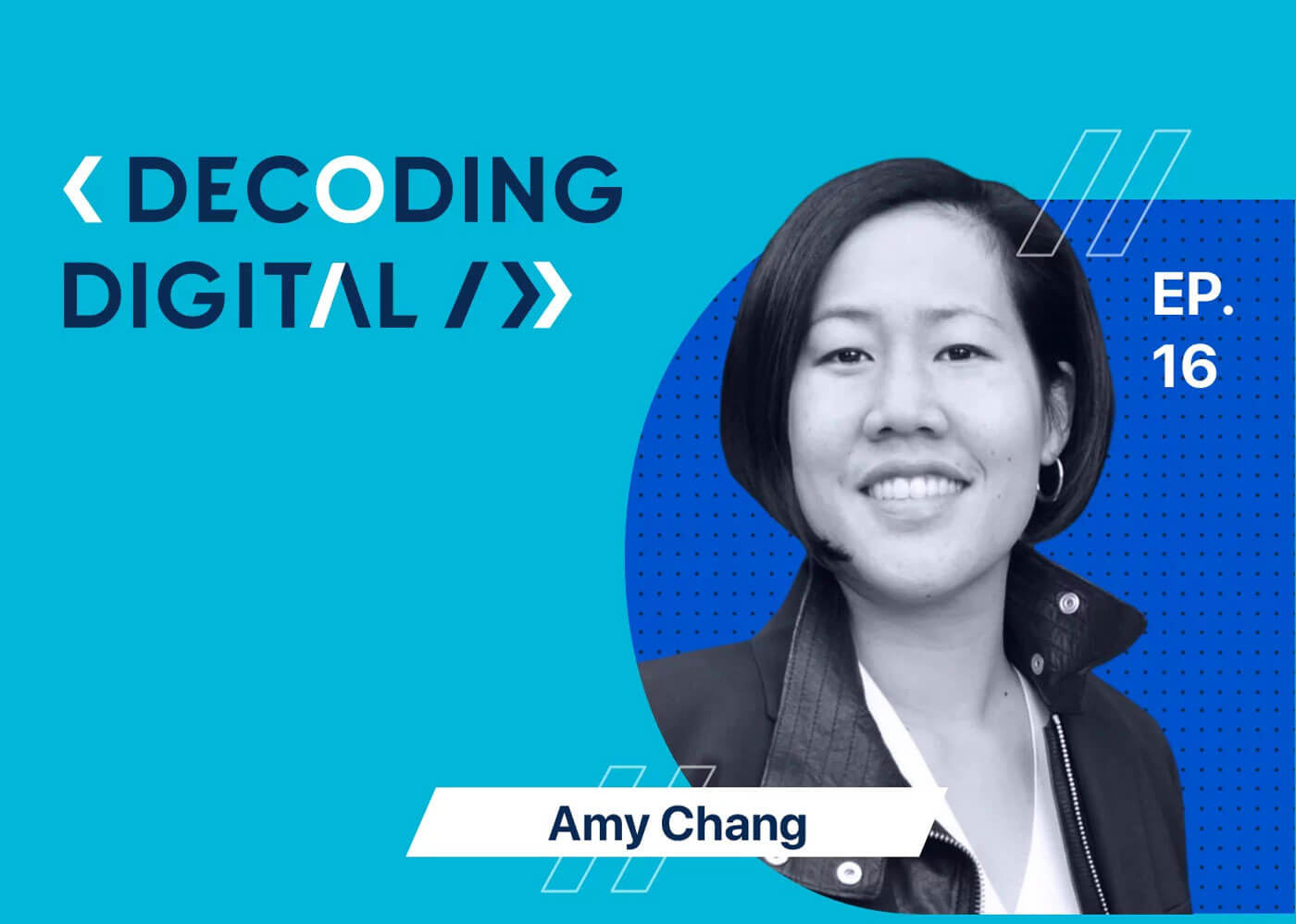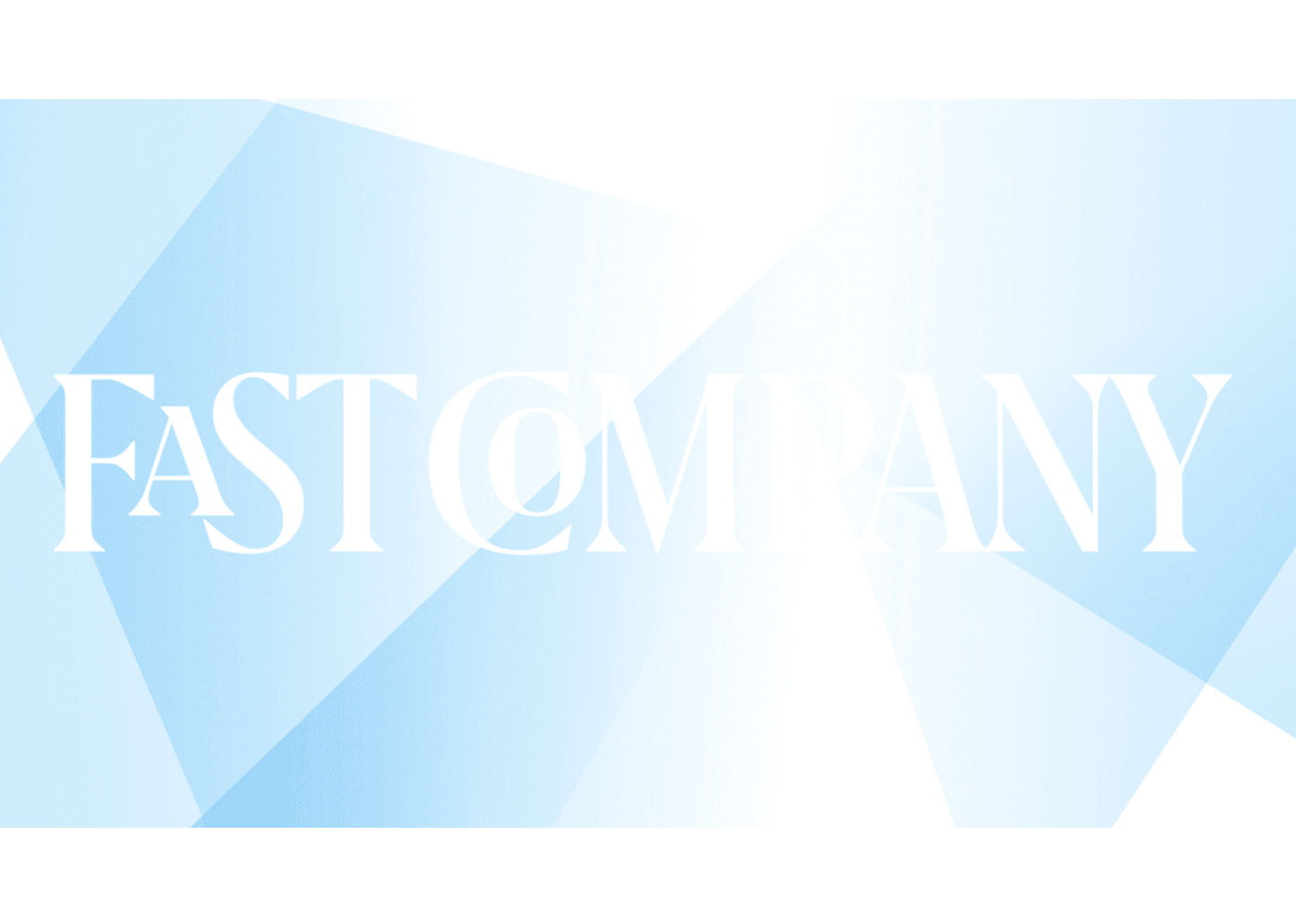23 Mar Decoding Fear: Amy Chang on Leaning into the Unknown
Decoding Fear: Amy Chang on Leaning into the Unknown

Leaving Google to start her own company was the scariest thing Amy Chang has ever done. But sometimes, doing what scares you is the best way to grow. Hear Amy’s remarkable journey as she left “safe” jobs at McKinsey and Google to found Accompany and lead a successful acquisition by Cisco. You’ll also learn her tips for leaning into fear to achieve your greatest ambitions.
Embracing #fear leads to great things. On the most recent episode of #DecodingDigital, I am joined by @ProcterGamble board member @_amychang to discuss how #entrepreneurs can embrace the unknown. Tune in! https://t.co/p7ZGGvkkSW
— Dan Saks (@danielsaks) March 23, 2021
All humans will experience moments of fear… I think that's very natural and normal. How you push through that fear and how you make it useful to you - that's the part that I think we all are training on and trying to be better at.
Quick Takes
Embracing the Unknown
I think if you're not scared at all, either you're fooling yourself or there might be something pathologically wrong with you, because if you're going from complete security to complete insecurity, all humans will experience moments of fear of the unknown. I think that's very natural and normal. And how you push through that fear and how you make it useful to you. That's the part that I think we all are training on and trying to be better at.
Leaning into Fear
I actually think that fear can be a very healthy thing. It can help speed up urgency. It can help make certain that you're prioritizing things properly and prioritizing resources properly. Because figuring out what to say ‘no’ to is as important as whatever you say ‘yes’ to.
The Myth of Fearless Leaders
I think it is such a common misconception that if you feel fear that perhaps you're not qualified to be CEO, that perhaps you shouldn't be an entrepreneur because entrepreneurs are fearless. And I just don't think that's true.
How do you deal with #fear? @_amychang, @ProcterGamble board member, shares how fear can motivate #entrepreneurs into action in this episode of #DecodingDigital. Listen to the episode in full: https://t.co/JLLBMJmxt7 pic.twitter.com/5yS3LZpDr7
— AppDirect (@AppDirect) March 23, 2021
Transcript

Amy Chang: [0:06] I think if you’re not scared at all, either you’re fooling yourself, or there might be something pathologically wrong with you. If you’re going from complete security to complete insecurity, all humans will experience moments of fear of the unknown.
[0:20] That’s very natural and normal. How you push through that fear and make it useful to you, that’s the part that I think we all are training on and trying to be better at.

Dan Saks: [0:35] That’s Amy Chang, board member of Procter & Gamble and founder of the AI powered business intelligence platform that was acquired by Cisco in 2018. Amy is a digital pioneer. She’s been listed as one of Fast Company’s most creative people, Fortune’s most powerful women, and Forbes’ top 50 women in tech.
[0:57] At Cisco, she led the company’s multi billion dollar Collaboration business, and its 5,000 person team. Amy also worked at Google, where she grew Google Analytics to serve over 86 percent of the entire Web. Currently, she serves as an advisor to high growth tech companies like HubSpot and Optimizely.
[1:18] In this episode, we learn about Amy’s entrepreneurial journey and her difficult decision to leave Google to start her own company. She also shares her tips on mastering fear and using it to achieve ambitious goals. This is Daniel Saks, co CEO of AppDirect, and it’s time to decode fear and leaning into the unknown.
[1:46] Welcome to “Decoding Digital,” a podcast for innovators looking to thrive in the digital economy. I’m your host, Daniel Saks, and I’ll sit down with other founders, CEOs, and changemakers to decode the trends that are transforming the way we work. Let’s decode.
[2:08] Amy, welcome. I’m so thrilled to be speaking with you today.
Amy: [2:11] I’m so thrilled to be here with you.
Dan: [2:14] Let’s start from the beginning. Tell us about how you got into technology.
Amy: [2:18] Our whole family is nerdy and engineers. Apparently, only produce engineers, so both my parents, engineers, my sister, engineer, me, engineer, [laughs] so that happened.
Dan: [2:29] Tell me what it was like to grow up in a family of engineers.
Amy: [2:32] My dad and I had a thing we did pretty much every night. We would watch reruns of “Star Trek Next Gen” from 9:00 to 10:00 PM. They were on one of our five channels on TV that you get for free because we were a Chinese frugal household that did not pay for cable, so that was what was on for free.
[2:49] We would watch pretty much every night, and that was our thing that we did together. It was really fun because then at Stanford, I got to take the philosophy of Star Trek Next Gen class where you talk about how Descartes relates to certain episodes or Hegel to other episodes, and it was crazy fun. That’s how we grew up.
Dan: [3:10] Clearly, Star Trek was about the future. Take us back then when you were at Stanford. What did you think the future would be like?
Amy: [3:18] I have to say one of the things that I love most is not to know it. Anything that could be in your imagination, at any given time, the future has so far eclipse anything I could have imagined.
[3:29] I think of, for example, automotive, and just getting around town and the first time the OS updated on the Tesla. We got into it and got onto AD and let it autopilot. It was mind blowing. The lane changing capabilities all of that. Just in that year, I’ve never expected it to come so quickly. I find I’m continuously pleasantly surprised by such things.
Dan: [3:59] Clearly, you’ve had the opportunity to sit on many boards and look at technology at the largest scale Cisco, Procter & Gamble. You’ve also had the opportunity to start your own startup. That’s really on the cutting edge of technology and AI. What advice would you give to someone starting their career in technology in order to get going?
Amy: [4:21] I think keeping an open mind and really allowing for serendipity to happen to. If you’re too stuck on any one subsector or any one idea, a lot of times you’ll miss the signals that are coming towards you that, maybe, you shouldn’t be ignoring.
[4:39] Even picking a subspecialty for whatever major, if you’re CS, UW or whatever you are, and being open to taking class is outside of that subspecialty and just being open to ideas and people and making sure that you’re within our people who open your mind to other possibilities, I think those pieces are all really important.
Dan: [4:59] Having an engineering background and going to Stanford, you probably had the opportunity to do a lot of things post school, but you chose to go to McKinsey. Can you tell us why?
Amy: [5:08] [laughs] That’s a funny one. I didn’t know I was going to choose to go to McKinsey, actually. I’ve gotten into this thing called the Mayfield Fellows Program in my senior year, and it lasted from senior year through co term year.
[5:20] It opened up an entire world, where I figured out I didn’t know anything about the go to market side of things. I didn’t even know what a business model was. I didn’t know what a supply chain was. I didn’t know what any of that was.
[5:30] It just felt like there was this whole half a sphere missing, a whole realm of things that I just had no idea about. I didn’t want to pay to go to business school and accrue a lot of debt because I figured I just didn’t want to.
[5:44] I looked at some of my friends who were going to McKinsey and Bain and BCG, and these places where it felt like they would give you an MBA level education in a few years, where they would pay you, and you would get to travel everywhere. [laughs]
[5:57] I had not been anywhere at that point, and I really wanted to go see the world. I decided I would go to McKinsey and I was [laughs] filmed.
[6:05] My poor dad said to me, “OK, so they don’t build anything. They don’t create anything. As far as I can tell, all they do is talk. Am I getting that, right?” I’m like, “Yeah, dad.” [laughs] [indecipherable] . He was thinking, “OK, so you’re going to give up. In an engineering position, to go and just talk and hear other people talk.” “OK.”
[6:27] I have to say the one thing you learn there at a consulting firm is how to tell a story a cohesive, coherent, compelling story. That has been useful for an entire career lifetime. You also start to understand the importance of a network, what could happen if you knew people and were connective tissue for other people in different ways. McKinsey was a phenomenal education.
[6:53] After two and a half years, I decided, “Yeah, I want to go build something. I want to go actually create,” and that’s when I left to go to eBay.
Dan: [7:00] Tell us about eBay.
Amy: [7:02] That was eBay’s heading because they’re growing really, really rapidly and it’s all about community, both the buyers and the seller community. It had a lot of heart. People were very, very passionate. It was still growing rapidly when I first got there, and I was managing the paid search and affiliates channels.
[7:22] What I got to see firsthand was how dependent all of these ecommerce marketplaces and players were on Google and Yahoo on paid search. The more I delved into it, the more clear it became that I needed to be on the supply side versus the demand side of this equation, which is when I went and interviewed at both Google and Yahoo.
[7:44] At the time, it wasn’t clear that Google would become what it’s become and Yahoo would become what it’s become. Because it was 2005, they were pretty neck and neck. Google was number one, but the share was tight.
[7:58] I interviewed at both. This is the thing you’ll find is, sometimes, you need some time to sit by yourself and absorb and then decide instead of just letting everything come at you. Google was like, “Come. Don’t come. We got 10 more like you.” [laughs] You make your call in 48 hours.
[8:17] Yahoo, Jeff Wiener was still leading search at the time. That man knows how to roll out the red carpet. He’s very persuasive and he did a really good job there and setting up the position, and I was really compelled by it.
[8:30] I decided, “OK, as one last check, I’m going to go and sit on both campuses by myself for a couple hours,” and you can’t get in the building, but they can’t keep you from just sitting outside of the building, which what’s going to stop you.
[8:42] I just went and sat in front of both. Yahoo just felt so different than Google. Google felt alive with energy. Meaning, people were walking to and from the different buildings. They were animated, and they were engaged in discussion. It felt almost like a college campus.
[9:01] You could tell that people felt strongly about whatever it was that we’re talking about is full of life, whereas at Yahoo if not more corporate. That was what made my decision for me, and I chose Google. [laughs] I have never regret that obviously since but it was a wild ride because at the time Google was still in the thousands, and we were doubling every six months.
[9:22] This is the thing that I always tell people who are earlier in career. Look for places with growth. If you are someone who wants to learn densely in his accelerated ways possible, nothing will provide that for you like growth well, because when there’s growth, there’s just so much room for taking on more responsibility and having more impact.
[9:43] The politics don’t start to come in until growth slows and a company is in stasis or is shrinking, because that’s when the elbows come out from people, but when you’re in growth and everybody needs to take on more responsibility every single week, there’s plenty of whitespace and plenty of room to ask for more, and you will grow as a result much more rapidly.
Dan: [10:05] What did you see at Google that led you to start a company?
Amy: [10:09] It wasn’t so much what I saw at Google. It’s what I experienced there leading Google Analytics. Google Analytics had reached the point where we were processing a billion queries per second. It’s a giant backend.
[10:22] We’ve also got into the way where we were serving almost 86 percent of the entire Web. When Facebook got a hit, we got a hit. When Twitter got a hit, we got a hit. When everybody got a hit, we got a hit.
[10:31] We started to realize we needed an enterprise grade solution. We were competing with Coremetrics and Omniture in the high end at that point, both of which since were acquired.
[10:42] Long story short, they had enterprise grade solutions where they had services. They had support. They had real enterprise salespeople to sell it. They had the whole go to market motion and stock. We had none of that.
[10:55] In order to service customers like Intel or Schlumberger, or whomever, we had to put a lot of that structure in place. I remember I went to this review with Larry and Sergey. I was a little bit arrogant in my assumption on what we could do with this business right off the bat.
[11:13] They were like, “OK. Well, if you think there’s a business to be had here, and you think it’s so important to multi channel attribution etc., etc. then you go build it. Why don’t you sell the first 10 customers, enterprise wise, yourself? Then come back and show us that people actually want this.”
[11:30] I was like, “Psh, no problem. With 10 million customers, I’m positive I can get 10 to sign up for this six figure amount annually. Not a problem.” I went off and I thought this would be a lot easier than it was. I got my ass handed to me. I knew nothing about enterprises [laughs] at all.
[11:48] I’m sitting in this meeting, and there are 19 executives from this giant Fortune 50 company. They had announced a huge layoff in reorg that morning, and I missed it because I’m also running Google Analytics while at the same time trying to sell these 10 customers.
[12:06] I missed it. I didn’t see it coming in the times. I opened my mouth and I inserted foot, my knee, my everything. Everything went in, and it was so embarrassing. I don’t know if you’ve ever felt the blood go from your neck all the way up to your scalp line. It’s like, “Rise up.” I just wanted the Earth to open up and swallow me.
[12:27] Then the third time that happened, I was thinking to myself, “OK, my calendar is available and the attendees are available. How is there not an intelligent service that can brief me and alert me on things I need to know if these are the meetings I have today?”
[12:43] Every single salesperson on Earth. Every single outbound person on Earth could use this. Why does it not exist? That was the pain that started the idea.
[12:53] Then my CTO and co founder, who…We’ve been good [laughs] friends at Google since my second week there because he helped me out of a massive technical jam. We worked closely together for the entire time. We were cool.
[13:07] We were discussing this and he was like, “Well, why don’t we go start this company? What’s stopping us from doing it? We should do it.” I went, “OK, so you want to do this together?” he was like, “Yeah, let’s do it.” That’s how that all started.
[13:23] Then our CFO and co founder was my husband who we met at McKinsey. He was CFO for that [indecipherable] company Ning before he was our CFO, and we were off to the races. It was super scary because leaving Google…Google’s a nice cocoon. [laughs] They treat their employees very well. Things were going well career wise, but then I had this feeling.
[13:48] Dan, have you ever…Right before you close your eyes at night, and then right when you open your eyes in the morning, you feel like there’s something missing. There’s something else. I should be much more grateful for where I am and what I’m doing right now. Why am I not feeling that?
[14:03] I feel like when you have that, it’s your subconscious telling you that there’s a change you want to make. You might fear making that change, but it’s there and it ends up the most important thing, the best thing.
Dan: [14:15] You describe that feeling so well. That feeling where you know that there’s something out there. That was the feeling that I had when me and my co founder decided to jump in. It’s funny because the question you say like, “Just do it. Let’s go. Let’s do it. What’s stopping us?”
[14:28] That’s often the question when I speak to entrepreneurs of that crazy moment. It’s like, “Let’s just take the leap. If you have that conviction and don’t look back, then great things can happen.” Maybe fast forward a few weeks after you had that conversation, “Let’s take that leap.” You quit Google. That’s incredible job running Google Analytics. Your husband. You’re both all in.
Amy: [14:49] To be fair, I took a sabbatical. If you’re not scared at all, either you’re fooling yourself or there might be something pathologically wrong with you. If you’re going from complete security to complete insecurity, all humans will experience moments of fear of the unknown.
[15:06] That’s very [laughs] natural and normal. How you push through that fear and how you make it useful to you, that’s the part that we all are training on and trying to be better at. I’ll tell you, it was the scariest thing I’ve ever done to leave Google because it was a great place.
[15:25] As my mom would tell me every couple of days, “Some people would give their right arm to be there and to be doing this. Google’s such a great company. How could you possibly leave? Who’s going to follow you? Who’s going to give you funding? How are you going to make this all work? Are you sure? Is this irresponsible parenting?
[15:42] There was [laughs] all of those questions and she was giving voice to my deepest, darkest fears. “Who’s going to follow you? Who’s going to fund this? Is anyone going to buy this? Is anyone going to care? Can we redo this outside of the Google machinery which is such an effective distribution engine?
[15:59] I had all of those questions and more sitting there, poking me at 2:00 AM when I would wake up, and be afraid of leaving.
Dan: [16:07] Let’s decode this fear.
Amy: [16:09] [laughs]
Dan: [16:10] Fear drives you to succeed. When I hear you telling me that your parents think you’re crazy, I feel maybe that’s a good sign that you’re doing the right thing as an entrepreneur, because my parents did the same thing.
[16:21] They’re like, “How could you be doing this? Why don’t you get a job somewhere?” That was the sign that, “Hey, maybe I’m crazy enough to do something great.” Tell me more about the fear, not only for you but for the people you attracted in the early days of the company.
Amy: [16:35] For you to be able to attract people, you have to [laughs] master that fear because you need to broadcast [laughs] some confidence and faith that this [laughs] is going somewhere.
[16:45] I got lucky and that I had two co founders. One, my best friend and one, my husband. That was lucky because it was a lot less lonely that way. I had two people who were as invested in the businesses as I was who I could talk to about anything.
[17:00] For every founder who’s thinking about starting a company, whether entrepreneurial or outside entrepreneurial, you’ve got to have your sounding boards.
[17:09] You almost have to have your kitchen cabinet where…These are people you can turn to for advice, for empathy, for…To be able to talk to people about the really difficult decisions that you will inevitably have to make, and to not be alone in making those decisions.
[17:26] It can be anybody on that kitchen cabinet. It can be siblings. It can be best friends. It could be work mentors. Anybody who you can trust to keep things in the vault. It’s so important in managing your own psychology to have some people who you trust, who you can talk to.
[17:42] The first time you have to fire somebody who’s been there for two or three years with you, who you like as a person, I hope it does tear you up. That means you’re human and you continue to experience the full gamut of emotions.
[17:56] It’s hard if they’re not the right person or fit for the company anymore. You can do it in a humane way, but it has to be done.
[18:05] There’s a thousand of those types of questions and issues that you’ll face. Having people to go to, to talk to makes it a lot less lonely. That’s fear mastering it alone. Maybe some people can do that. That wasn’t my style. I like to have partners in crime, and it was so helpful to do that.
Dan: [18:25] Clearly, there’s fear at the beginning, fear of failure. What other fear did you have to overcome in the early stages of the business?
Amy: [18:33] There is fear every day. When you see a competitor do something, you’re like, “Oh, geez,” or an API shuts down that you had access to. A data source shuts down that you had access to. Is this going to happen more?
[18:48] You hear about some piece of legislation that might come to pass that affects you. There’s all kinds of meteorites that are coming into your atmosphere on any given day that could be scary. Learning, again, how to make that fear work for you is a big part of it.
[19:06] Dan, have you experienced that too, where something comes in from the left field that you read in the morning of some competitors doing something that is in your next release or two releases out? All of a sudden, you’re like, “Oh, crap. How far ahead are they in this particular arena?”
[19:20] How you master that and make it work for you and work for the team, that’s the differentiator.
Dan: [19:28] Definitely. Every day there’s something that comes up from left field, sometimes when you’re multitasking. It’s like that feeling of being in a meeting engaged, and then you get a text saying…
Amy: [19:38] Wait!
Dan: [19:38] The platform’s down.” This is it. This is our challenge. What are the techniques you found to master that fear?
Amy: [19:45] I actually started meditating about nine years ago. [laughs] It helped me immensely.
[19:52] What I have found working with the coaches, almost everyone who’s ENTJ from Myers Briggs Type needs to meditate, by the way, because your team will appreciate it. We’re naturally bossy, demanding, impatient, and urgent people. [laughs] To make that leadership style work for the team, meditation is really helpful.
[20:13] I find I listen better after I meditate. I’m calmer in the face of these exogenous factors coming in. They’re more easily put into perspective. That has been something that’s been so helpful to me. My husband can literally tell if I haven’t meditated that day, and he’ll be like, “Hey, do you want to make some time for meditation?” [laughs]
Dan: [20:35] What other techniques do you have to master fear?
Amy: [20:38] I think one of the biggest ones, one day a month, what I would do is in every other month, this got violated because of some customer related issue but once every other month and I put it in for once a month, don’t forget because things happen I would actually go away either by myself or with just one or two select members in the team that we needed to bring trust with.
[21:01] I take those issues. At any given time, I have a note on my phone that listened to issues that I felt like were going to be most existential or the scariest things if I thought about them that I didn’t have time to process in that moment, but it would be a persistent layer of fear that would accompany me through my day, so I’d write them into this note.
[21:23] Then, once a month, I’d take them out and just fully, fully tackle them and get totally in it, and immerse in that issue, immerse in that fear and figure out what is it I’m afraid of around this issue. Let me get all the information I could possibly get. Then, I’m going to make a decision.
[21:42] Whatever call I make right or wrong, we will iterate from it, and we will zig and zag, but we’re not going to sit here in paralysis right over this issue, this fear. We’re going to figure out what we’re going to do about it, what we’re going to go out and do it, or we’re going to figure out it’s not worth solving. There’s no point in being scared of it and shove it into a box.
[22:01] My co founder had this visualization. He was like, “Yeah, it’s almost like you put it in a box. Then, you shoved it into a closet, and you close the door and walk away, and it’s calling.” [laughs]
[22:12] You just have to decide. Am I going to do something about it, or am I going to just say, “You know what? There’s nothing I can do about this, so I’m not going to focus on it.”?
Dan: [22:20] We talked about fear as an entrepreneur, but you also have the opportunity to sit on boards of some of the largest companies in the world working with CEOs that have hundreds of thousands of employees. From the outside, you look at these CEOs, and you’re like, “They probably are fearless, and they’ve done this,” but can you give us insights into the fear that they might have?
Amy: [22:41] The bigger, crazy fortuitous thing about being on the Cisco and Procter & Gamble boards at the same time was that they would often have board meetings one day after the other. On a Monday, Tuesday, we went to Procter. Then Tuesday night, Wednesday, we might have Cisco.
[22:55] When Venezuelan destabilization happens, when tariff happens, when COVID happened, all of these huge macro forces happening worldwide. I will get to see how these two world class CEOs handle this issue, and it was the densest learning you could possibly imagine. You put yourself through thinking, “OK, how would I have handled this as the Procter CEO or as the Cisco CEO? What would I have done?”
[23:23] The most important thing is what would I’ve missed, or what would I have not realized, what would have just flown right over my head, and let me learn from that and let me delve into that.
[23:34] This thing about both David and Chuck, they’re very human, very empathetic, very servant leadership style CEOs. They care deeply about their people. I mean, feel for their people. They care. Every employee we have actually genuinely matters to them. They’re two people with high EQ and emotion. It matters. The human aspect of, it matters.
[24:02] I think when you’re someone who experiences the full range of human emotion, of course, you experience fear. That’s normal, but I’ve never seen either of them paralyzed by fear. I’ve never even seen them express fear in a non functional way. I mean, they might say, “OK, well, this is a fear that we should have as company, but here’s what we’re gonna do about it.”
[24:22] At the board level, it’s always accompanied by here’s what we’re going to do about it. I think that it has to be the case of the board because it’s the board, but watching these two have to traverse so many macro economic issues in the last few years has been crazy helpful.
Dan: [24:38] Oftentimes, people feel fear in their daily lives and feel that that fear means that they can’t be a CEO, or they can’t be an entrepreneur. Do you agree with that statement?
Amy: [24:48] Absolutely not. I vehemently disagree with that statement, and I’m glad you put it that way and you asked because I think it is such a common misconception that if you feel fear, that perhaps you’re not qualified to be CEO, that perhaps you shouldn’t be an entrepreneur because entrepreneurs aren’t fearless. I just don’t think that’s true.
[25:10] I’m going to bring Star Trek Next Gen back into this for a second. [laughs] Captain Picard is the fictional leader I most admire out of any content I’ve ever viewed or read, and the reason is not because he never felt fear. The reason is because he overcame it for the sake of his team, the sake of his crew, and that the well being of his team mattered more to him than his own fear.
[25:37] I think for every good CEO, and entrepreneur, you should care about your team. You shouldn’t feel fear for them. You should feel the full range of human emotions. Sadness for when you have to lay off some folks because you know they have families. You know they have kids. You know they have dependents.
[25:54] Knowing what you have to do for the business, you may fear doing it and you may feel extreme empathy for the people who it affects, and you work through that. I think it makes you a better leader to feel those feelings and to be able to relate to all the team members that you have.
[26:13] I actually think that fear can be a very healthy thing. It can help speed up urgency. It can help make certain that you’re prioritizing things properly and prioritizing resources properly because figuring out what to say no to is as important as whenever you say yes to.
[26:30] Sometimes, fear can be that factor that reminds you to examine it, reminds you to pull up, and look at how you’re using the company’s resources and figure out if that’s the right way to do it. Fear can help you be more deliberate. It can help you know that you need to prioritize. These are healthy ways to leverage it.
[26:48] I just never want anyone to think that just because they have that fear, that they shouldn’t be a CEO or an entrepreneur. I absolutely don’t agree with that.
Dan: [26:57] It’s interesting because you have an engineering background. You ran Google Analytics, but here, we’re talking about psychology and fear and all the soft stuff.
Amy: [27:05] Humans are the most complex and the messiest part of what you will deal with as a leader, but they’re also the most rewarding part of what you will deal with as a leader.
[27:14] If you think back to all the jobs you’ve had, do you remember the exact metrics in any given quarter? Do you even remember the projects? No, really not, but you will remember the people that you worked with. You remember the teams that you were on and that you were with. That’s what indelibly gets impressed and imprinted into your memory because human portion of it is what matters the most.
[27:37] [background music]
Dan: [27:38] Amazing. Thank you so much for joining us. It’s truly inspirational and really appreciate the time.
Amy: [27:43] Me too.
AC: You’ve known me for a long time. I think you’d probably say that everything about my very being is urgent! I think I was born impatient and have always been one of those people that even when standing is shifting from one foot to the other, aching to move. This sense of urgency about the market window is shared by the team. Some people are more easygoing than others, but we all know that there’s a window and we need to get out there during that window. This team also understands that every user matters, so once you take users on, you better serve them as well as you can, as fast as you can. So, the funding hasn’t touched that sense of urgency. It did give us the runway and the means to build a product that requires an underlying data platform and an intelligence layer that sits atop that platform. That takes time and it takes money – two things funding helped enable.
Related Amy Chang Articles
Fast Company September 20, 2019
As artificial intelligence (AI) and machine learning begin to make dramatic changes behind the scenes of how companies operate, hear from Cisco’s Amy Chang as she shares how the customer service experience will become more personalized.
Fast Company by Amy Chang, November 29, 2019
Amy Chang of Cisco reveals how watching people walking by and observing facial expressions and body language she could discern if they were actually enjoying working together.
Marie Claire by Brooke Hauser Aug 23, 2018
Amy Chang in Marie Claire’s Immigration Issue: “I grew up knowing I was going to have to bring it. Every single day. There’s no free lunch. No free rides. No free anything, just sheer effort and persistence.”



